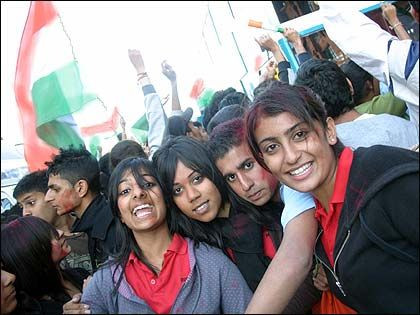Indians Dominate East African Economy, But Still Lack Total Acceptance

The government of Kenya has asked Indian investors to help boost its local small and medium sized enterprises.
Moses Ikiara, managing director of Kenya Investment Authority, said Indian technology could greatly help Kenya's manufacturing sector which is dominated by small companies.
"We are keen to have Indian firms establish joint ventures with local [small and medium-sized enterprises] so that we can benefit from appropriate technologies that will enhance the productivity of the sector," Ikiara said at a trade show in Nairobi earlier this week. "We are therefore looking for partners who can help Kenyan goods achieve the price and quality competitiveness required to access foreign markets.”
Ikiara noted that India is now the third largest investor in Kenya.
Rahul Chhabra, high commissioner of India to Kenya, said bilateral trade volume between the countries amounted to at nearly 220 billion shillings ($2.2 billion) as of 2018.
"Though the trade balance is tilted in favor of India, Kenyan exports to India have risen by about 89% over the last year," Chhabra said.
Kenya also has a small but economically powerful Indian community.
In the summer of 2017, the Kenyan government officially anointed Indians as the country's 44th tribe.
While the tribal designation does not provide specific rights and privileges, it is something the Indian community had long sought.
In neighboring Uganda, the local Indian community continues to advocate for tribal recognition, without much success.
Forty-seven years after President Idi Amin ordered their expulsion, Indians have returned to Uganda and established a dominant position in the local economy.
Now, some members of the Indian community want to be listed as one of Uganda’s official “tribes” – but stubborn opposition to this measure may prevent it.
Indians have a supporter in President Yoweri Museveni who has promised to include Indians as one of Uganda’s tribes in the Constitution.
“Since we already have many tribes in Uganda I see no problem in adding another tribe of Indians in the constitution. We shall add the Indians in the constitution,” Museveni said. “We can have another tribe called Wahindi [Indian] in our constitution. We shall call you Wahindi. There is no problem in having an extra tribe called Wahindi in the constitution.”
Museveri praised Indian contribution to the local economy.
“You are the ones who are creating wealth so why shouldn’t you be involved in policy decisions,” he said. "The Indians accelerated economic growth of the country by stimulating industrialization through trade, manufacturing, delivery of both human and animal drugs and extensive agriculture.”
The Uganda constitution presently comprises 60 recognized indigenous communities.
Asians began to return to Uganda in 1986 after Museveni took power (he is now in his sixth). Now while Indians represent less than 1% of Uganda’s population, they pay 65% of the taxes – underscoring how Indians have taken control of some of the East African country’s economy, including hotels, banking, manufacturing and retail.
However, some members of Uganda’s parliament strongly oppose the recognition of Indians as a Ugandan tribe, especially when a number of poor indigenous peoples have not been so recognized.
Peace Regis Mutuuzo, the minister of state for gender and culture, said Indians cannot be designated as a tribe of Uganda. “I think Indians can be Ugandans by dual citizenship, by marriage, and by birth. But in as far as integrating them as an indigenous tribe, we would not have met our criteria,” Mutuzo said.
Mutuuzo explained that under the terms of the 1995 Constitution, tribal status can only be granted to indigenous communities that were documented and recognized as of Feb. 1, 1926.
In addition, she declared that Indians did not originate in Uganda anyway, and belong to a vastly different culture.
“The Indians know where they come from and we know: a country called India,” she said. “We know where India is and we know where Uganda is. So it is easy to identify and differentiate between an Indian and a Ugandan.”
Some Ugandan members of Parliament also noted Indians have a history of discriminatory behavior toward black Africans and refuse to assimilate.
© Copyright IBTimes 2024. All rights reserved.





















